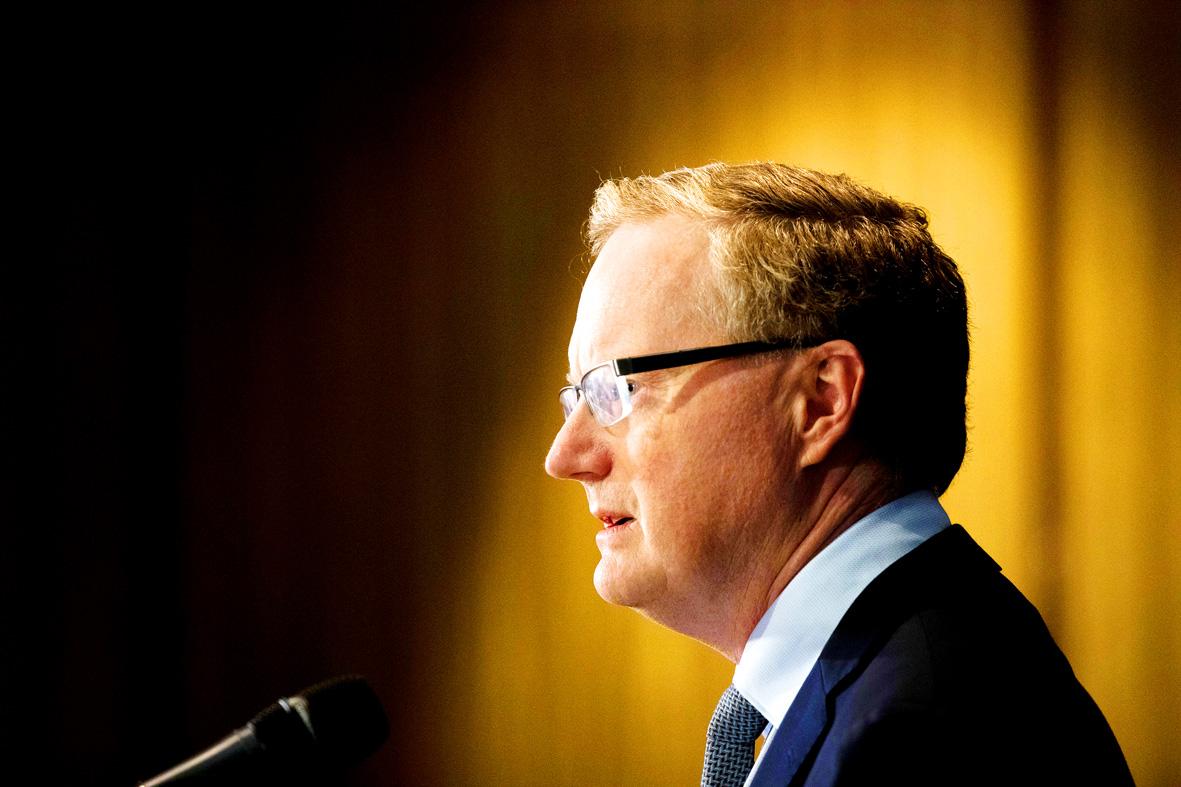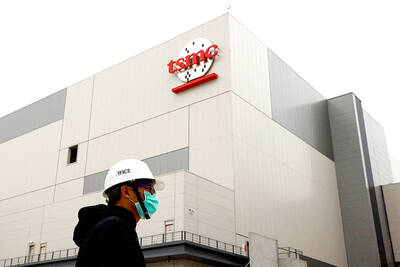Australia’s central bank yesterday kept rates at record lows and pledged to keep three-year government bond yields at its 0.25 percent target as it predicted the COVID-19 pandemic would trigger a massive economic decline.
The Reserve Bank of Australia (RBA) on March 19 announced an out-of-cycle rate cut to 0.25 percent and an unprecedented stimulus package, which included an unlimited quantitative easing program.
The board yesterday confirmed all of the elements of that package, saying that it would not raise interest rates until it made progress in achieving its employment and inflation goals.

Photo: Bloomberg
The decision comes as some economists predict the worst recession in Australia’s history, which would see the unemployment rate almost doubling to near 10 percent.
Economic indicators yesterday offered a foretaste of the pain to come with March job vacancies posting their largest drop in more than a decade.
“There is considerable uncertainty about the near-term outlook for the Australian economy,” RBA Governor Philip Lowe said in a short post-meeting statement.
“Much will depend on the success of the efforts to contain the virus and how long the social distancing measures need to remain in place,” Lowe added. “A very large economic contraction is, however, expected to be recorded in the June quarter and the unemployment rate is expected to increase to its highest level for many years.”
Restrictions on people movement and gatherings have forced many businesses in hospitality, retail, transport, education and even community services to shut down. Businesses that remain open face falling sales and increasing operational restrictions.
A survey released yesterday by the Australia and New Zealand Banking Group (ANZ) showed that total job advertisements last month fell 10.3 percent from February, the steepest decline since January 2009, when the global financial crisis was raging.
Separately, a service sector index showed that activity last month shrank for a fourth straight month, as it fell to the lowest in 11 years.
It was not all gloom, with another survey released yesterday by ANZ and Roy Morgan showing that consumer sentiment bounced last week after two months of drastic declines, as a government “JobKeeper” plan to subsidize some workers somewhat lightened the mood.
In anticipation of a steep contraction in GDP, the central bank has so far bought A$38 billion (US$23.46 billion) of Australian government bonds — or nearly 7 percent of outstanding stock — to help keep borrowing costs low.
The functioning of the bond market has improved since it launched its quantitative easing program on March 20, the bank said, adding that “smaller and less frequent purchases” would likely be required.
That remark led to a sell-off in long-term bonds, sending 10 year yields to a 10 day high of 0.951 percent. The Australian dollar also spiked to a one-week high of A$0.6168 against the greenback.
“That extremely aggressive pace of [bond] purchases can’t be sustained for long,” Marcel Thieliant of Capital Economics Ltd said. “A case could still be made for corporate bond purchases, as spreads have continued to widen.”

Stephen Garrett, a 27-year-old graduate student, always thought he would study in China, but first the country’s restrictive COVID-19 policies made it nearly impossible and now he has other concerns. The cost is one deterrent, but Garrett is more worried about restrictions on academic freedom and the personal risk of being stranded in China. He is not alone. Only about 700 American students are studying at Chinese universities, down from a peak of nearly 25,000 a decade ago, while there are nearly 300,000 Chinese students at US schools. Some young Americans are discouraged from investing their time in China by what they see

Taiwan Semiconductor Manufacturing Co (TSMC, 台積電), the world’s largest contract chipmaker, yesterday reported record sales for the first quarter, which analysts attributed to solid demand for emerging technologies. Consolidated revenue totaled NT$592.64 billion (US$18.51 billion) in the January-to-March period, up 16.5 percent from a year earlier, but down 5.26 percent from the previous quarter, TSMC said in a statement. The first-quarter revenue beat analysts’ average projection of NT$579.5 billion, Bloomberg News reported. That performance lends weight to expectations that the world’s most valuable chipmaker would return to solid growth this year after weathering a post-COVID-19-pandemic cratering of smartphone and computer sales. TSMC is budgeting

MAJOR DROP: CEO Tim Cook, who is visiting Hanoi, pledged the firm was committed to Vietnam after its smartphone shipments declined 9.6% annually in the first quarter Apple Inc yesterday said it would increase spending on suppliers in Vietnam, a key production hub, as CEO Tim Cook arrived in the country for a two-day visit. The iPhone maker announced the news in a statement on its Web site, but gave no details of how much it would spend or where the money would go. Cook is expected to meet programmers, content creators and students during his visit, online newspaper VnExpress reported. The visit comes as US President Joe Biden’s administration seeks to ramp up Vietnam’s role in the global tech supply chain to reduce the US’ dependence on China. Images on

US CONSCULTANT: The US Department of Commerce’s Ursula Burns is a rarely seen US government consultant to be put forward to sit on the board, nominated as an independent director Taiwan Semiconductor Manufacturing Co (TSMC, 台積電), the world’s largest contract chipmaker, yesterday nominated 10 candidates for its new board of directors, including Ursula Burns from the US Department of Commerce. It is rare that TSMC has nominated a US government consultant to sit on its board. Burns was nominated as one of seven independent directors. She is vice chair of the department’s Advisory Council on Supply Chain Competitiveness. Burns is to stand for election at TSMC’s annual shareholders’ meeting on June 4 along with the rest of the candidates. TSMC chairman Mark Liu (劉德音) was not on the list after in December last